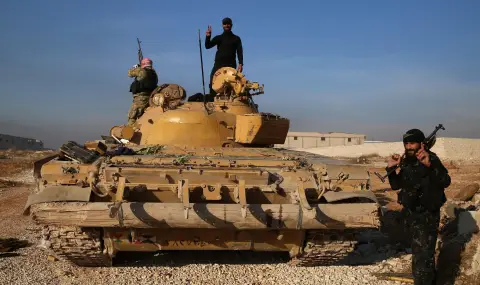The offensive of the Syrian rebel groups, which yesterday captured the second key city in the country after Aleppo - Hama, and the resistance of the government forces of President Bashar Assad are one of the central topics in the Western press, BTA reported.
The Assad regime is shaken, but it still seems unlikely that it will "be overthrown", believes analyst Joseph Deicher in the American newspaper "Washington Post". The author of the study "Syria after the Uprising: Political Economy and State Resilience" is of the opinion that it will be a test for the leading rebel movement "Hayat Tahrir al-Sham" to hold the conquered territories "both in terms of military capabilities and in terms of human resources". "They are losing a lot of strength", Deicher wrote in "The Washington Post".
Meanwhile, in the capital, Damascus, President Assad is protected by the Fourth Army Armored Division, commanded by his brother Maher, as well as by Iranian-backed paramilitary groups. According to Deyher, it does not seem likely that Iran and Russia, which intervened in the Syrian civil war to keep the president in power, will abandon him now, although they are not as motivated as possible to regain the territories lost by government forces.
The influence of both Moscow and Tehran on the development of events in Syria is currently weakened, because the center of their attention has shifted, respectively, to Russia's war in Ukraine and Iran's increasingly direct involvement in the conflict with Israel, notes Joseph Deyher in the "Washington Post".
Iran is trying to restore the network of its proxy groups, especially after the Israeli offensive in Lebanon against the positions of the local Shiite group "Hezbollah" - another ally of Assad. "Hezbollah" fighters fought alongside Syrian government forces during the Syrian civil war, but right now the movement is "too busy in Lebanon", the analysis of the "Washington Post" reports.
The group is trying to reorganize itself after a series of deaths in Israeli strikes among its top leadership. Accordingly, "the primary task remains to strengthen its positions in Lebanon - both militarily and politically", Deyher points out, adding that it is unclear to what extent "Hezbollah" fighters will be willing to re-dedicate themselves to the cause of the Syrian government.
In an operational material on the events in Syria, the "Washington Post" notes that the jihadists' reckless offensive has redrawn the "front lines" in the country and exposed the "vulnerability" of Assad's army. The capture of the fourth largest Syrian city - Hama, looks like another blow to the president less than a week after entering Aleppo, the publication writes.
At the same time, in another American newspaper - "New York Times", Ben Hubbard draws attention to the fact that the Islamist rebels, led by "Hayat Tahrir al-Sham", are moving quickly towards the capital Damascus. The lightning capture of Hama after the withdrawal of government troops was accompanied by a call from the jihadist leader Abu Muhammad al-Julani to storm other Syrian cities, including the capital.
"Citizens of Homs, get ready!", he said in a video message, which, according to the group he leads, "Hayat Tahrir al-Sham" was recorded on Wednesday. According to the author in the "New York Times", the current rebel offensive adds a new dimension of unpredictability to the conflict that has been tearing Syria apart for more than a decade, opens up niches for Islamists, draws in both Russia and the United States, while simultaneously creating refugee crises in countries neighboring Syria.
A third American newspaper - "Wall Street Journal", in turn, emphasizes the fact that now on the road from jihadist-controlled Northern Syria to the capital Damascus, only one large city remains that is still in Assad's hands - Homs. Inhabited by about 800,000 people, it has a strategic location - between Damascus, the Mediterranean Sea and neighboring Lebanon, notes the author in the publication Jared Molsin.
The British newspaper "Guardian" recalls that it was in Hama that fierce fighting took place when the uprising against Assad broke out in 2011, and then - in the course of the civil war that broke out, opposition forces never managed to capture the city. Hama is also the site of the infamous bloodshed in 1982, when the forces behind Bashar Assad's father, Hafez, repressed the city's residents to prevent the rise of Sunni opponents of power, notes "The Guardian".
Now the residents of Hama, as well as the population of Homs and Damascus, are being agitated to join the revolution to decide their own fate, another British publication, "The Independent", points out. It quotes a rebel post on social media that reads "Your hour has struck!"
